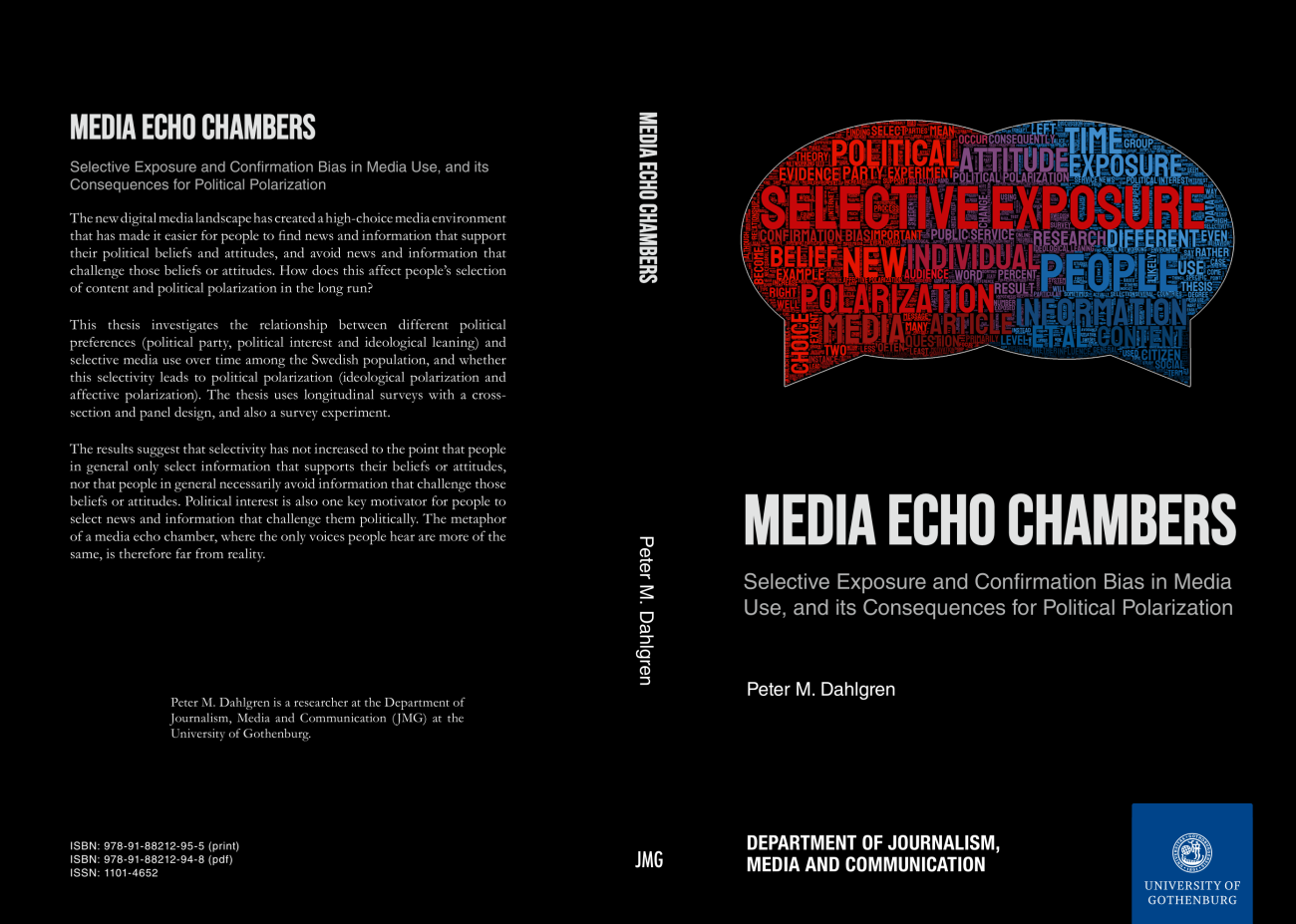Media Echo Chambers
Selective Exposure and Confirmation Bias in Media Use, and its Consequence for Political Polarization
PhD thesis on how people select media based on their political preferences. Svenska

Abstract
The new digital media landscape has created a high-choice media environment that has made it easier for people to find news and information that support their political beliefs and attitudes, and avoid news and information that challenge those beliefs or attitudes. How does this affect people’s selection of content and political polarization in the long run? This thesis investigates the relationship between different political preferences (political party, political interest and ideological leaning) and selective media use over time among the Swedish population, and whether this selectivity leads to political polarization (ideological polarization and affective polarization). The thesis uses longitudinal surveys with a cross-section and panel design, and also a survey experiment. The results suggest that selectivity has not increased to the point that people in general only select information that supports their beliefs or attitudes, nor that people in general necessarily avoid information that challenge those beliefs or attitudes. Political interest is also one key motivator for people to select news and information that challenge them politically. The metaphor of a media echo chamber, where the only voices people hear are more of the same, is therefore far from reality.
Thesis frame
Articles
Cite
| Author: | Dahlgren, Peter M. |
|---|---|
| Publication: | PhD thesis Compilation thesis with 3 articles and a thesis frame |
| Pages: | 154 |
| Published: | 2020-12-17 |
| ISBN: | 978-91-88212-95-5 (print) 978-91-88212-94-8 (pdf) |
| Language: | English |
| University: | University of Gothenburg Göteborg (Sweden) |
Dahlgren, P. M. (2020). Media Echo Chambers: Selective Exposure and Confirmation Bias in Media Use, and its Consequences for Political Polarization. Göteborg: University of Gothenburg. https://hdl.handle.net/2077/67023
BibTeX@book{dahlgren_media_2020,
address = {Göteborg},
title = {Media {Echo} {Chambers}: {Selective} {Exposure} and {Confirmation} {Bias} in {Media} {Use}, and its {Consequences} for {Political} {Polarization}},
isbn = {978-91-88212-95-5},
url = {https://hdl.handle.net/2077/67023},
abstract = {The new digital media landscape has created a high-choice media environment that has made it easier for people to find news and information that support their political beliefs and attitudes, and avoid news and information that challenge those beliefs or attitudes. How does this affect people’s selection of content and political polarization in the long run? This thesis investigates the relationship between different political preferences (political party, political interest and ideological leaning) and selective media use over time among the Swedish population, and whether this selectivity leads to political polarization (ideological polarization and affective polarization). The thesis uses longitudinal surveys with a cross-section and panel design, and also a survey experiment. The results suggest that selectivity has not increased to the point that people in general only select information that supports their beliefs or attitudes, nor that people in general necessarily avoid information that challenge those beliefs or attitudes. Political interest is also one key motivator for people to select news and information that challenge them politically. The metaphor of a media echo chamber, where the only voices people hear are more of the same, is therefore far from reality.},
language = {EN},
publisher = {University of Gothenburg},
author = {Dahlgren, Peter M.},
year = {2020},
note = {ISBN (PDF): 978-91-88212-94-8}
}
